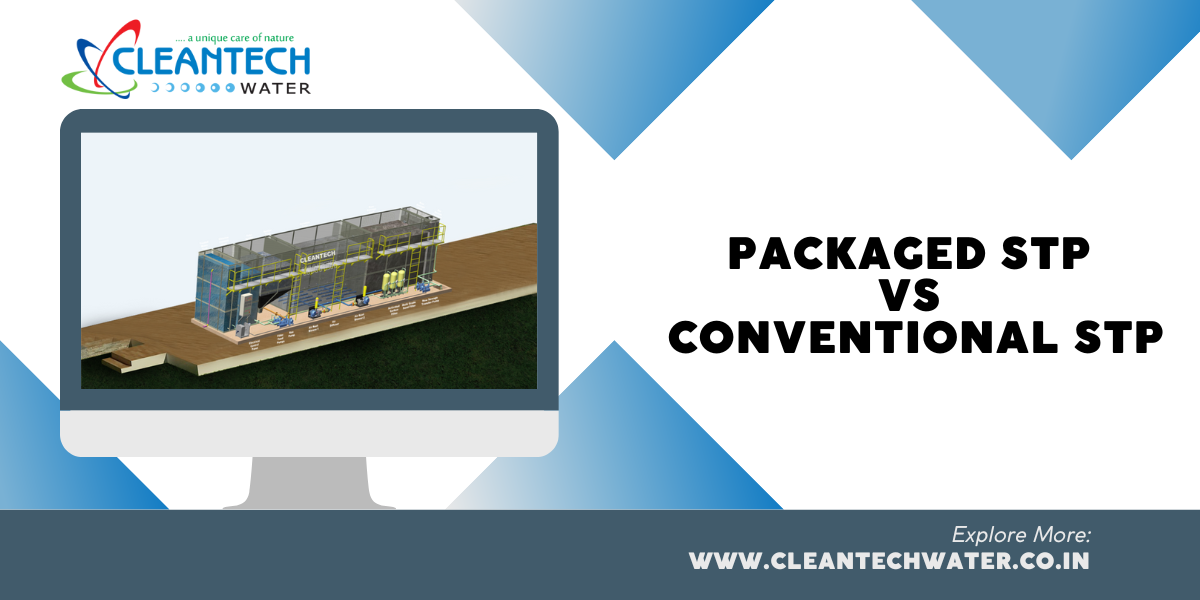India’s demand for effective wastewater treatment is growing at a breakneck pace. With rapid urbanisation, booming construction, and increasing awareness of environmental regulations, both residential and industrial sectors are actively seeking reliable sewage treatment solutions.
But when it’s time to choose, the big question is: Should you go with a traditional method or opt for a modern packaged sewage treatment plant?
This is not just a technical decision—it’s a strategic one that can impact your costs, timelines, and long-term compliance.
In this article, we break down the core differences between conventional STPs and the increasingly popular packaged sewage treatment plants. By the end, you’ll have clarity on what works best for your specific needs—and why.

What is a Packaged Sewage Treatment Plant?
A packaged sewage treatment plant is a compact, ready-to-use system designed to treat wastewater at the source. Unlike traditional setups that require civil construction and complex infrastructure, packaged STPs are pre-engineered, modular, and easy to install. They’re shipped as complete units and can be up and running within days, not months.
These systems come equipped with modern biological treatment processes, such as MBBR (Moving Bed Biofilm Reactor), and are designed to comply with CPCB and local pollution control norms. Depending on the need, they’re built using FRP (Fiber-Reinforced Plastic), MS, or RCC, offering both durability and resistance to corrosion.
Common applications include:
- Apartment complexes and gated communities
- Small to medium industrial units
- Hotels, resorts, and hospitals
- Remote construction or mining sites
- Commercial buildings and IT parks
Today, packaged sewage treatment plant manufacturers across India are offering fully automated systems that need minimal supervision while ensuring high-quality treated water, often suitable for reuse in gardening, flushing, or even cooling towers.
What is a Conventional Sewage Treatment Plant?
A conventional STP is a large-scale setup that typically serves municipalities, large factories, or government projects. These systems are custom-built from the ground up, involving substantial civil work, land allocation, and longer timelines for commissioning.
They use well-established biological, mechanical, and sometimes chemical processes to treat sewage—ranging from primary sedimentation to secondary biological treatment and tertiary filtration. Conventional STPs are usually fixed in place and demand a team of operators to manage day-to-day operations, maintenance, and compliance.
If you’re dealing with very high volumes of wastewater, especially with variable loads or industrial contaminants, a conventional STP offers more flexibility and scalability.
However, this flexibility comes at a cost, both in terms of capital investment (CapEx) and space requirement. These systems are often overkill for smaller projects, making them impractical in compact or remote environments.
Key Differences: Packaged vs Conventional STP
Let’s cut through the jargon and get straight to the facts. Here’s how the two systems stack up against each other:
| Feature | Packaged STP | Conventional STP |
| Installation Time | Very fast, modular, and prefabricated | Slow – involves civil construction |
| Space Requirement | Extremely compact | Requires a significant land area |
| Mobility | Portable and easy to relocate | Permanently fixed |
| CapEx | Lower due to off-site fabrication | Higher due to onsite construction |
| Maintenance | Minimal – often automated | Requires skilled manpower and daily monitoring |
| Applications | Ideal for small-scale, decentralised use – housing societies, hotels, remote setups | Best for large-scale and centralised treatment – municipalities, industrial parks |
By comparing these aspects, it’s clear that packaged sewage treatment plants bring unmatched speed, flexibility, and efficiency to smaller and mid-sized projects, while conventional STPs continue to serve their purpose in mega infrastructures.
Get a Custom STP Quote”
Which STP is Right for You?
Choosing the right type of STP depends on your project scale, location, and wastewater load. Here’s a quick breakdown to guide your decision:
Residential Projects & Housing Societies
When it comes to housing complexes, gated communities, and apartment clusters, the sewage treatment solution must be easy to install, operate, and maintain. A packaged sewage treatment plant checks all those boxes. It’s compact enough to fit into basements or corner utility areas, runs quietly, and handles typical domestic waste without requiring technical staff on-site. For RWAs and builders, this means faster project completion, better compliance with local norms, and lower operating costs.
Hotels, Resorts, and Hospitals
In hospitality and healthcare settings, every square foot counts—and so does hygiene. An FRP packaged sewage treatment plant is ideal here due to its compact design, corrosion resistance, and odour-free performance. These sectors also face routine inspections and must comply with strict discharge norms, especially for water reuse. Packaged STPs ensure reliable treatment while maintaining aesthetic and operational standards of premium facilities.
Industrial Units
Industrial units often deal with fluctuating volumes and variable compositions of wastewater, sometimes with high Total Dissolved Solids (TDS), oils, or chemicals. In such cases, a custom-designed conventional STP is better equipped to manage complex treatment processes and higher loads. However, for small to medium industries or units with biodegradable waste, an MBBR package sewage treatment plant offers an efficient and space-saving solution, balancing performance and cost.
Smart Cities & Construction Sites
Fast-paced infrastructure development demands quick, flexible, and mobile solutions. Packaged STPs are ideal for smart cities, remote construction projects, or temporary settlements. These plug-and-play systems can be easily transported, set up within days, and even relocated as project sites change. Their modularity allows scaling as the population or sewage load increases—perfect for dynamic urban expansion models.
Large-Scale Government Projects
Government-run infrastructure—like townships, industrial corridors, or public institutions—often requires treatment systems with high capacity, long-term reliability, and customisation. Here, conventional sewage treatment plants are the better choice. They can handle large daily loads, integrate multiple treatment stages, and be tailored to specific local discharge standards. While the initial investment and time to build are higher, the long-term benefits in efficiency and durability are unmatched.
Advantages of Choosing a Packaged STP Today
For many residential, commercial, and semi-industrial projects across India, the packaged sewage treatment plants are becoming the preferred option—and for good reason. The benefits extend far beyond just faster installation.
Faster ROI
One of the biggest advantages of a packaged sewage treatment plant is the accelerated return on investment. Since these systems are pre-engineered and come fully assembled, installation and commissioning happen quickly, often within days. That means you start treating sewage (and meeting legal compliance) much faster, which leads to quicker cost recovery and operational benefits.
Easier Compliance with CPCB Norms
Environmental regulations in India are tightening, especially around water discharge and reuse. Packaged sewage treatment plant manufacturers now offer units that are built to meet or exceed CPCB standards, reducing your risk of penalties and shutdowns. These systems come with real-time monitoring, digital reporting, and consistent effluent quality, helping you stay on the right side of the law.
Future-Ready with Automation and Smart Monitoring
Automation is no longer a luxury; it’s a necessity. Today’s MBBR package sewage treatment plant systems include smart controls, remote diagnostics, and sometimes even IoT-based performance tracking. These features reduce dependency on manual operators and minimise errors, ensuring consistent performance and operational ease.
Greener Footprint
A FRP packaged sewage treatment plant is not just compact—it’s eco-conscious. These systems consume less energy, require minimal civil work, and generate lower sludge volumes compared to traditional plants. The result? Reduced operational emissions and a smaller environmental footprint, making your project more sustainable from the start.
What to Consider Before Making a Decision
While a packaged solution offers many benefits, it’s crucial to evaluate your project needs before making a final choice.
1. Treatment Capacity Required
Ask yourself: How much sewage needs to be treated per day? For small to medium capacities, a packaged sewage treatment plant in India is a cost-effective and scalable choice. For larger volumes, especially for industrial operations, a conventional plant may be better.
2. Available Space
Packaged STPs are space savers. But even then, placement, accessibility for maintenance, and drainage layouts must be considered. If you’re working with limited land, like in metro cities, a compact unit is often the only viable option.
3. Budget
Your initial and long-term budget matters. Packaged STPs come with lower CapEx and OpEx, making them financially attractive. But high-load applications might justify the bigger investment of a traditional system.
4. Timeline for Setup
Need to be up and running in a few weeks? Packaged sewage treatment plants are the way to go. These systems reduce your project lead time significantly.
5. Regulatory Compliance Needs
If your facility is under strict environmental scrutiny, opt for a system that delivers consistent output quality and real-time monitoring. Modern packaged STPs are built with compliance in mind.
Why Cleantech Water Is the Smart Choice for Your Wastewater Treatment Plant
Choosing the right wastewater treatment plant isn’t just a compliance decision—it’s a long-term investment in sustainability, efficiency, and peace of mind. Whether you manage a residential complex, a commercial facility, or an industrial unit, your treatment solution should work seamlessly, save resources, and keep you ahead of regulatory changes.
At Cleantech Water, we specialise in delivering high-performance, low-maintenance wastewater treatment plants tailored to your exact needs. From compact packaged sewage treatment plants to large-scale conventional setups, we offer turnkey solutions backed by industry expertise and PAN-India support.
Don’t leave your wastewater management to chance. Make the smart move today with a system designed for performance, compliance, and the future.
Contact us at +91-9099915539 or +91-9558996411 or send us your queries to info@cleantechwater.co.in for a free consultation, system demo, or project quote — and take the first step toward a cleaner, compliant, and cost-effective operation.
Let’s build better water solutions together.

